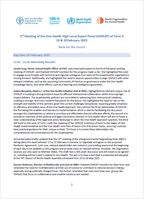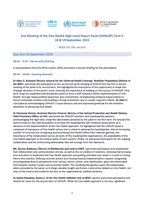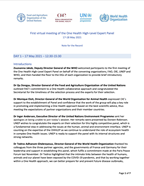Meetings and working groups- Term I
Panel meetings
The Panel intends to meet 5-6 times a year in plenary session, where all aspects of the different working groups will be reviewed together to develop a portfolio of key issues, knowledge and evidence gaps. These will be further prioritized according to their potential for making a difference in the prevention of emerging zoonoses, and as part of the development of a research agenda. The Panel will give guidance and inputs to the four partner agencies, FAO, OIE, UNEP and WHO related to their work of generating knowledge and evidence on One Health, including the potential development of a roster of additional external experts and resources on One Health. The Panel will develop evidence-based recommendations for global, regional, national and local action, to be summarized in an annual panel report.
Meeting notes
All →

First in-person meeting of the One Health High-Level Expert Panel (Term II) advances Quadripartite collaborationThe One Health High-Level Expert Panel...

The Panel intends to meet 5-6 times a year in plenary session, where all aspects of the different working groups will be reviewed together to develop a...
Thematic Group meetings
The One Health High-Level Panel (OHHLEP) has set up four thematic groups to maximize efficient work on the four initial focus areas identified during their first meeting 17-18 May 2021 (see Notes).
The Thematic Groups will regularly meet in full or sub-groups and report their outcomes to the panel.
Thematic Group 1: One Health Implementation
Core members: Casey Barton, Pepe Bilivogui, Natalia Casas, Salama Al-Muhairi, Catherine Machalaba, Nitish Debnath, NataliaCediel Becerra, Elmoubasher Farag, Salome Bukachi, Osman Dar
Chairs of TG 1: Catherine Machalaba and Osman Dar
Terms of reference
- Define “One Health” in the context of the panel
- Identify case studies demonstrating good practice in One Health relevant to detecting, controlling and preventing emerging zoonoses. Specifically, what worked, how were barriers overcome, governance arrangements, funding, incentives, etc.
- Develop a theory of change to make One Health go from a theoretical concept to the daily practice of the collaborative work between the different sectors (health, agriculture, environment) and at different levels.
- Identify technical and institutional barriers for implementation of One Health on the ground
- Suggest/develop improved flexible sustainable implementation strategies for One Health, focusing on preventing emerging zoonoses in different contexts.
Thematic Group 2: Inventory of current knowledge in preventing emerging zoonoses
Core members: Wanda Markotter, Thomas Mettenleiter, Dominique Charron, Casey Barton
Chairs of TG 2: Wanda Markotter and Thomas Mettenleiter
Terms of reference
- Systematic review and inventory of useful documents, knowledge-sharing platforms, capacity building tools, projects, networks, committees for the use of One Health approaches in the prevention of emerging zoonoses
- Identify successful transnational and national strategies and/or ministerial/administrative set-ups that have shown practical and useful intersectoral collaboration (examples of good practice)
- Identify and review One Health workforce initiatives
- Review best practices and identify the gaps to be addressed
- Develop and prioritize a portfolio of issues (e.g. recommendations, approaches, options) that would make a difference in the prevention of emerging zoonoses at the global, regional, national and subnational level
Thematic Group 3: Surveillance, early detection and rapid data sharing in the prevention of emerging zoonoses
Core members: Marion Koopmans, Janice Ciacci Zanella, Zhou Lei, Wiku Adisasmito, Baty Dungu, Margaret Khaitsa, Vyacheslav Smolenskiy, David Hayman
Chairs of TG 3: Marion Koopmans and David Hayman
Terms of reference:
- Define One Health surveillance (coordinated, integrated, technical, ethical, legal, cultural etc.)
- What do we know about the presence of potential zoonotic pathogens, including current hotspot identification work
- Identify existing international guidance and novel approaches for integrated disease surveillance and the level of implementation
- Identify existing agreements and systems allowing/facilitating sharing of surveillance data.
- Identify and define a One Health interlaboratory system for sharing of technology, biologics, samples, data, results to provide early detection of pathogens and utilization of data
- Develop a practically implementable surveillance framework and good practice guidelines
Thematic group 4: Factors causing spillover and subsequent spread of diseases
Core members: Andrew Cunningham, Serge Morand, John Mackenzie, George Gao, Catherine Machalaba, Abhishek Chaudhary, David Hayman, Osman Dar, Salome Bukachi, Elmoubasher Farag
Chairs of TG 4: Andrew Cunningham and Salome Bukachi
Terms of reference
This includes all factors such as wildlife trade, food production and distribution, traditional markets, land-use changes, biodiversity, animal production and trade, human action, biosafety and biosecurity, any other relevant environmental issues, including climate change
- List all potential factors and then systematically analyze the evidence for risk of zoonotic spillover. Broad but also specifically to regions/countries.
- What are the gaps, what factors are neglected and what should be prioritized?
- Consider tools already available for multisectoral risk assessments and investigate if HACCP (Hazard Analysis Critical Control Point) or TACCP (Threat Assessment and Critical Control Points) principles could be adapted as risk assessment possibilities.
